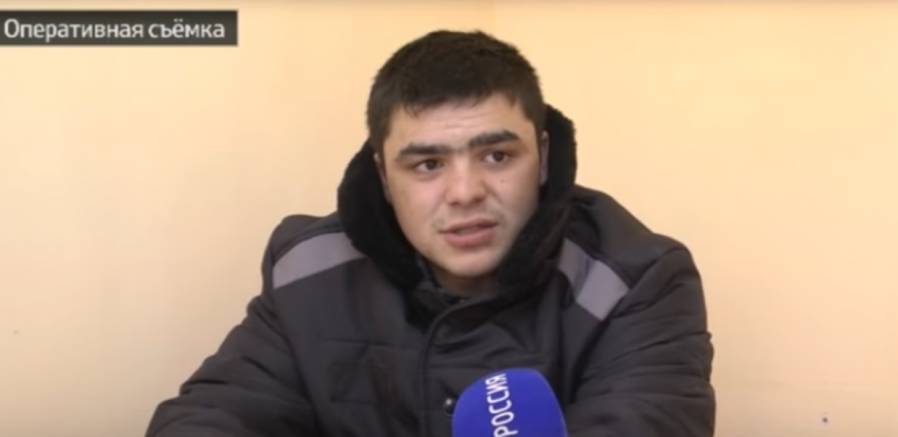• Topics / Human Rights Abuses in Russian-occupied Crimea
Ominous arrest of a Crimean Tatar activist and claims of training in sabotage & terrorism

Russian FSB border guards are reported to have arrested a young Crimean Tatar, described in most pro-Kremlin media as a ‘saboteur’ and member of the ‘Asker Battalion’. Since Seit-Ibraim Zaitullaev is currently charged ‘only’ with attempting to cross what Russia calls its ‘state border’ and was arrested much earlier, it is possible that he is being used in Russia’s ongoing attempts to present the Asker civic formation as a terrorist organization.
Crimea SOS has ascertained that Zaitulllaev was, in fact, detained during the night from 9-10 February, and has been held in the SIZO [remand unit] in Simferopol since then. Zaitullaev’s mother Lilia says that she was at the SIZO on Saturday, but could not speak with her son properly because of the convoy guards. As to why he tried to come to Crimea, he had time to say only that he had missed them. As well as his mother, he has a girlfriend still living in Dzhankoy. The only lawyer is one appointed by the FSB, and his mother is possibly being careful in what she says about her son’s arrest. She told Crimea SOS that she had not seen any signs that he has been tortured, and that from what she heard, “they talk with him normally”. The investigator has said that “he may get a suspended sentence but that this is for the court to decide”. In fact, a prison sentence is not at all guaranteed for the charge of illegally crossing the border, and there is nothing to indicate that any court under Russian occupation independently ‘decides’ on sentences, but these are only some of the questions raised by this arrest and its presentation.
The TASS report on Feb 17 asserted that Zaitullaev had “admitted to having been part of a Crimean Tatar battalion which trained specialists for sabotage in Crimea” for over a year. The border guards were supposed to have caught him trying to cross into Crimea, bypassing the checkpoint, and that in searching him, they had discovered an Asker ID document.
Asker leader Lenur Islyamov confirmed to Radio Svoboda that Zaitullaev had indeed been a member of their formation but that he had left 2 months earlier. Islyamov called him a talented musician and said that he had badly missed his homeland. He was hoping to enter a technical university in mainland Ukraine.
The state-controlled Rossiya 24 TV channel called Zaitullaev a ‘saboteur’ and produced the customary FSB video (with a TV channel’s microphone!) in which the young man talks of training in carrying out terrorist acts, sabotage and intelligence, with these acts of sabotage planned also at the border crossing. Such apparent ‘confessions’ have been the main part of the FSB’s arsenal against Ukrainians it takes prisoner since the arrest of Ukrainian filmmaker Oleg Sentsov, activist Oleksandr Kolchenko and two other opponents of annexation back in May 2014.
This one is somewhat different, since 8 days after taking the young man prisoner, the investigator has laid only a charge of crossing the border illegally. It is possible that Zaitullaev has been put under pressure to provide false testimony against the Asker Battalion, with a lesser charge and sentence on offer if he cooperates.
There is no empirical evidence to substantiate the claims made about the Crimean Tatar formation training members to commit acts of sabotage or terrorism, but they do echo the standard claims constantly made in the Russian media.
In April 2016, Islyamov announced that the battalion was being formed to help patrol the area bordering Russian-occupied Crimea. His activists had been involved in the Crimea Blockade initiated in September 2015 and which later came to include an electricity blockade. Russia and its propaganda media began accusing Crimean Tatars of terrorism, sabotage, etc. over the Blockade. They came up with extraordinary allegations, such as that veteran Crimean Tatar leader Mustafa Dzhemiliev and other leaders were recruiting fighters for the so-called Islamic State, or training them locally. Nobody has admitted responsibility for the explosions which cut electricity in November 2015, but in fact power was reinstated after that. Ukraine, however, quite correctly refused to agree to a contract for supplying electricity that called Crimea Russian, so attempts to blame Ukraine for ongoing electricity shortages or to accuse it of ‘Crimean genocide’ are absurd.
In creating the civic formation, Islamov promised also that it would help to combat Russia’s information warfare which was targeting the Kherson oblast. There have long been attempts to destabilize the situation in the oblast, as there have claims that Ukraine is planning acts of sabotage in occupied Crimea.
There has been criticism of some of the activists involved in the Blockade and there was recently conflict between Asker members and the police, though this seems to have been swiftly resolved.
There is no evidence of any terrorist activities or trained saboteurs.





